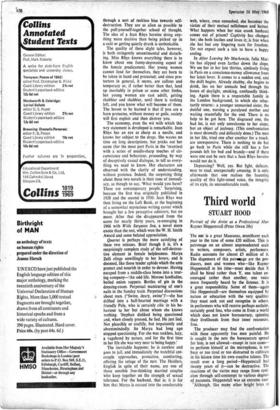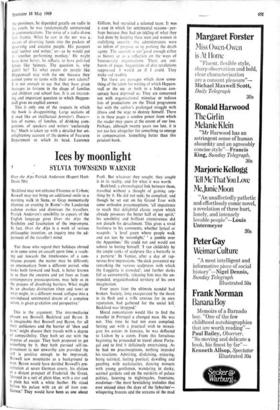Portrait of the Artist as a Professional Man Rayner Heppenstall
(Peter Owen 38s)
Third world
STUART HOOD
Portrait of the Artist as a Professional Man Rayner Heppenstall (Peter Owen 38s) The BBC is a great Maecenas, munificent each year to the tune of some £20 million. This is patronage on an almost unprecedented scale to writers, composers, artists, performers. Radio accounts for almost £5 million of it. The dispensers of this patragage are the pro- ducers, men and women who—like Rayner Heppenstall in his time—must decide that X shall be hired rather than Y, one talent en- couraged rather than another, one voice more frequently heard by the listener. It is a great responsibility. Some of them—again like Heppenstall—are themselv.es equipped by nature or education with the very qualities they must seek out and recognise in others, in performers who will receive perhaps acclaim, certainly good fees, who come in from a world which does not know bureaucracy, spinning their livelihoods from their inner resources, free.
The producer may find the confrontation with these apparently free men painful. He is caught in the nets the bureaucrats spread for him, is not allowed—except in rare cases— to perform himself at the microphone, is too busy or too tired or too distracted to cultivate in his leisure time his own creative talents. The result over a long period—Heppenstall had twenty years of it—can be destructive. The reactions of the victim may range from cyni- cism through self-contempt to various degrees of paranoia. Heppenstall was an extreme case. Although, like many other bright boys in the provinces, he depended greatly on radio in his youth, he was fundamentally uninterested in communications. The noise of a radio drove, him frantic. What he saw in the BBC was means of diverting funds into the pockets of deserving and creative people. His passport said 'author and writer,' or—as he would put it—'another performing monkey.' He might have done better, he reflects, to have polished lenses like Spinoza. The question is, why didn't he? To what extent do people like Heppenstall stay with the Bac because they cannot come to terms with their own talents? It is not enough to say that they have given hostages to fortune in the shape of families and children and school fees. It is an interest- ing and important question to which Heppen- stall gives no explicit answer.
This is only one of the respects in which the book is disappointing. Large sections of it read like an intellectual Jennifer's Diary— lists of names, of lunches, of drinking com- panions. of speakers and writers 'exclusively his.' Much is, taken up with a detailed but un-, enlightening account of the demise of Features Department to which its head, Laurence
Gilliam, had recruited a talented team. It was a case in which for sentimental reasons—per- haps because they had an inkling of what they had done by keeping these men and women in stultifying security-- the administrators were so infirm of purpose as to prolong the death agony. The account is not good enough either as history or as a reflection on the ways of bureaucratic organisations. There are out- bursts of pique. Suggestions of dire revelations suppressed. I would an if I could. They make sad readine.
Yet there are passages which show some- thing of the talent for writing of which Heppen- stall or the sac or both in a hideous con- spiracy have deprived us. They are concerned not with organisational minutiae or tedious lists of productions on the Third programme but with the author's prolonged struggle with illness and the urge to destroy himself. There is in these pages a sombre power from which the reader may guess at the extent of our loss. Perhaps, although twenty years too late, it is not too late altogether for something to emerge in compensation. Something better than this petulant book.







































 Previous page
Previous page